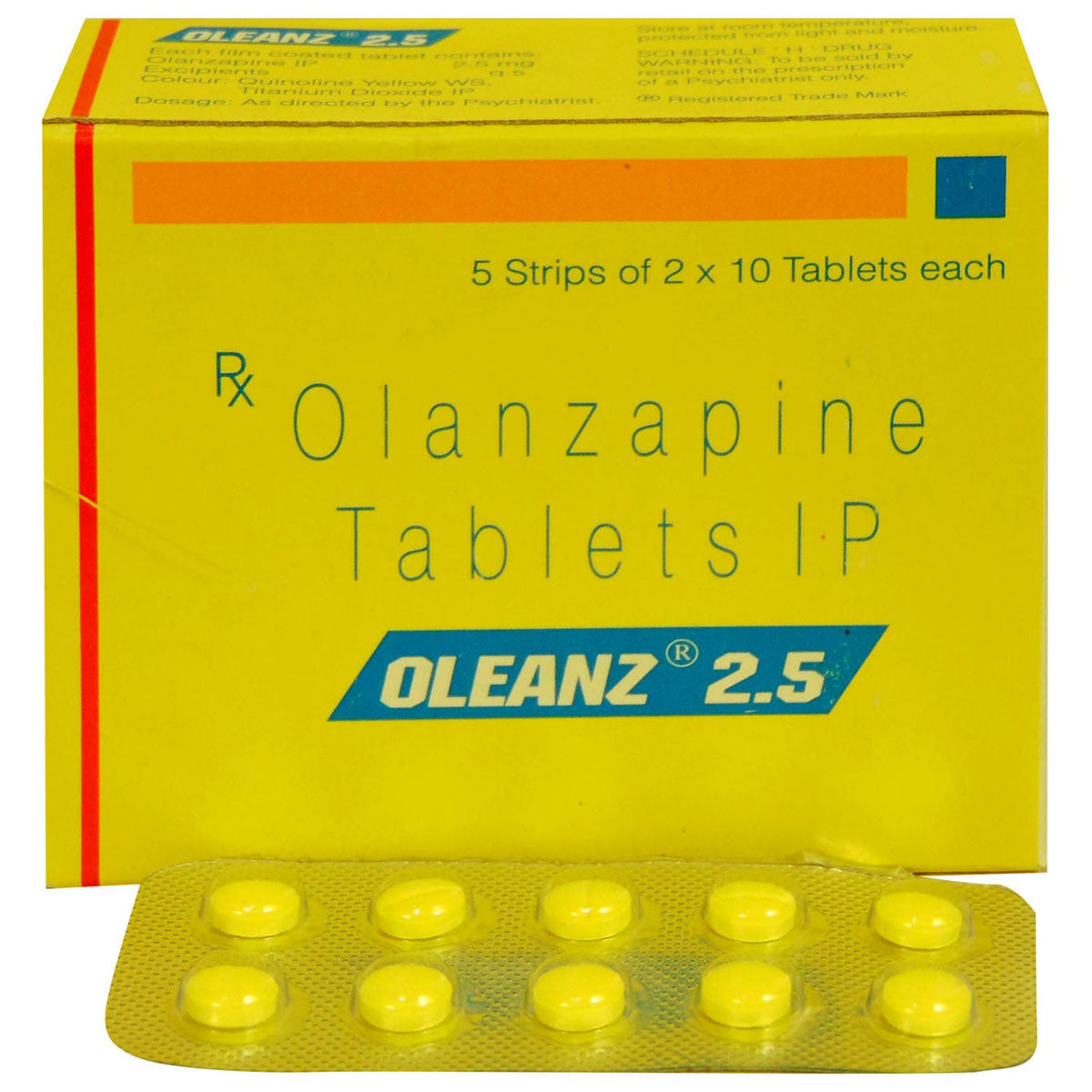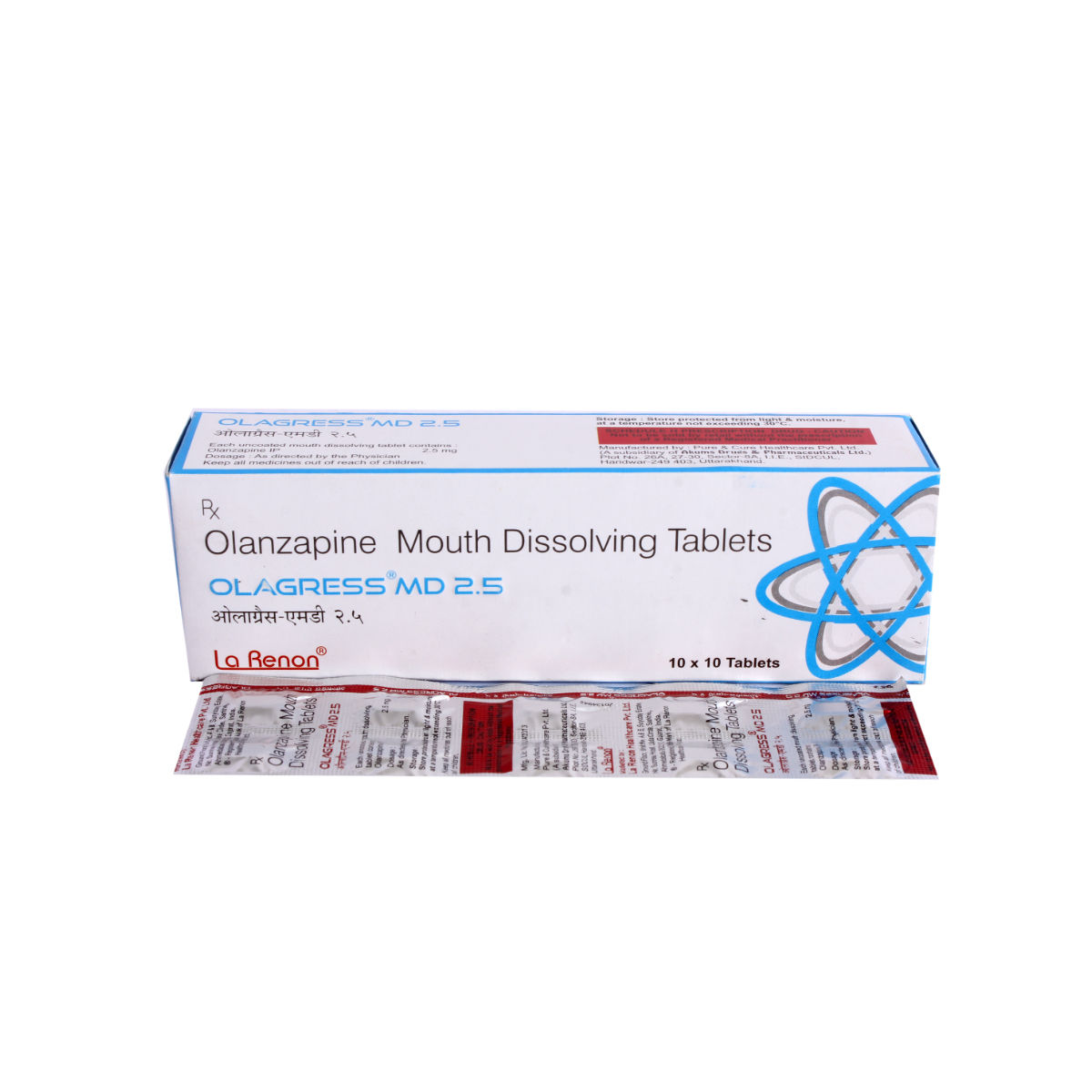Olpicad MD 2.5 mg Tablet 10's
₹13.5*
MRP ₹15
10% off
₹12.75*
MRP ₹15
15% CB
₹2.25 cashback(15%)
Free Delivery
With Circle membership
(Inclusive of all Taxes)
This offer price is valid on orders above ₹800. Apply coupon PHARMA10/PHARMA18 (excluding restricted items)
Know Your Delivery Time
Provide Delivery Location

Whats That

Secure Payment

India's Most Trusted Pharmacy

Genuine Products
Composition :
Manufacturer/Marketer :
Consume Type :
Return Policy :
Expires on or after :
About Olpicad MD 2.5 mg Tablet
Olpicad MD 2.5 mg Tablet is used to treat schizophrenia and manic depression (bipolar disorder). Schizophrenia is a mental condition in which the person may feel, hear or see things that are not there (hallucinations), believe things that are not true, and feel unusually suspicious or confused. Manic depression, or bipolar disorder, is a serious brain disorder in which a person experiences extreme mood swings (variance in thinking) and frequent mood and behavioural changes.
Olpicad MD 2.5 mg Tablet contains 'Olanzapine' that works by restoring the balance of chemical messengers (dopamine and serotonin) in the brain and improves thinking mood, and behaviour. It helps in clear thinking and decreases hallucinations. It is used for treating manic episodes of bipolar disorder and agitation in schizophrenia.
Take Olpicad MD 2.5 mg Tablet as prescribed by your doctor. Common side effects include drowsiness, dizziness, restlessness, tremors/shakiness, stomach upset, dry mouth, constipation, increased appetite, fatigue, decreased libido, swelling of the hands or feet, and weight gain. These side effects are not familiar to everyone and vary individually. If you notice any side effects that are not manageable, please consult your doctor.
Olpicad MD 2.5 mg Tablet is not recommended for treatment in patients with Dementia-Related Psychosis. Inform your doctor beforehand if you have a history of allergic reactions to Olanzapine, Alzheimer's disease, liver or kidney diseases, heart problems, breathing problems, high cholesterol, glaucoma, diabetes, breast cancer, enlarged prostate, or fits before starting this medicine. If you are pregnant, planning to conceive, or a breastfeeding mother, inform your doctor before starting Olpicad MD 2.5 mg Tablet . Avoid consuming alcohol while being treated with Olpicad MD 2.5 mg Tablet as it can make you dizzy or drowsy. Do not drive or operate machinery while using Olpicad MD 2.5 mg Tablet since it can make you sleepy. This medicine is not recommended for children below 12 years of age.
Uses of Olpicad MD 2.5 mg Tablet
Medicinal Benefits
Olpicad MD 2.5 mg Tablet is used to treat schizophrenia and manic depression (bipolar disorder). It effectively treats manic episodes of bipolar disorder and agitation in schizophrenia. It contains 'Olanzapine,' which belongs to the class of atypical antipsychotics. It works by restoring the balance of chemical messengers (dopamine and serotonin) in the brain. It is also known to improve thinking, mood, and behaviour. It helps in clear thinking and relieves psychotic symptoms like hallucinations.
Side Effects of Olpicad MD 2.5 mg Tablet
- Drowsiness
- Dizziness
- Restlessness
- Tremors/shakiness
- Stomach upset
- Dry mouth
- Constipation
- Increased appetite
- Fatigue
- Decreased libido
- Swelling of the hands or feet
- Weight gain
Directions for Use
Storage
Drug Warnings
Olpicad MD 2.5 mg Tablet is not recommended for treatment in patients with Dementia-Related Psychosis. Brief your medical history to the doctor if you have any allergic reactions, liver or kidney diseases, Alzheimer's disease, dementia, heart problems, breathing problems, high cholesterol, glaucoma, diabetes, bowel problems, breathing problem during sleep (sleep apnea), low white blood cell count, breast cancer, enlarged prostate, or fits before starting Olpicad MD 2.5 mg Tablet . Please consult your doctor if you are pregnant or planning to conceive before starting this medicine. Olpicad MD 2.5 mg Tablet is not recommended during breastfeeding. Avoid consuming alcohol as it might lead to increased side effects like dizziness and drowsiness. Avoid driving or operating machinery as Olpicad MD 2.5 mg Tablet may decrease your mental alertness, making you feel dizzy or drowsy. Olpicad MD 2.5 mg Tablet is not recommended for people below 12 years of age as safety and effectiveness have not been established.
Therapeutic Class
Drug-Drug Interactions
Drug-Food Interactions
Diet & Lifestyle Advise
Maintain proper weight by following a healthy diet.
Exercise regularly as it helps in less cognitive decline and brain volume loss.
Avoid smoking and alcohol consumption.
Try to avoid stress by practising meditation or yoga.
Include fruits and vegetables in your diet as they contain antioxidants.
Eat nutritious food as it helps in cognitive stimulation.
Limit foods with high cholesterol and saturated fats.
Cut down on sugar, salt and processed foods.
Drink plenty of water.
Follow a healthy lifestyle as it helps in improving overall health and possibly protects the brain.
Habit Forming
How Olpicad MD 2.5 mg Tablet Works
What if I have taken an overdose of Olpicad MD 2.5 mg Tablet
Alcohol
Unsafe
It is advised to avoid alcohol consumption while taking Olpicad MD 2.5 mg Tablet . Alcohol intake and Olpicad MD 2.5 mg Tablet may cause increased dizziness and drowsiness. Please consult your doctor for more information.
Pregnancy
Caution
Olpicad MD 2.5 mg Tablet is a pregnancy category C drug. Using antipsychotic drugs during the third trimester of pregnancy can cause muscle problems in newborn babies. Please inform your doctor before taking Olpicad MD 2.5 mg Tablet if you are pregnant or planning to conceive. Your doctor will weigh the potential risks and benefits before prescribing Olpicad MD 2.5 mg Tablet .
Breast Feeding
Unsafe
Olpicad MD 2.5 mg Tablet is excreted into the breast milk; hence it is not recommended for a nursing mother. Inform your doctor before taking Olpicad MD 2.5 mg Tablet if you are a breastfeeding mother.
Driving
Unsafe
Olpicad MD 2.5 mg Tablet may make you feel dizzy or drowsy. Do not drive if you are not mentally alert or experience any symptoms that affect your ability to drive or operate machinery.
Liver
Caution
Dose adjustment may be needed in patients with liver impairment. Please inform your doctor if you have a liver impairment or any concerns.
Kidney
Caution
Please inform your doctor before using Olpicad MD 2.5 mg Tablet if you suffer from severe kidney impairment. Your doctor may adjust the dose if necessary based on your condition.
Children
Unsafe
Olpicad MD 2.5 mg Tablet is not recommended in people below 12 years of age.
Country of origin
Manufacturer/Marketer address
Author Details
We provide you with authentic, trustworthy and relevant information
FAQs
Disclaimer
Product Substitutes
Reference
- https://www.drugs.com/mtm/olanzapine.html
- https://www.medicines.org.uk/emc/files/pil.3071.pdf
- https://www.nami.org/About-Mental-Illness/Treatments/Mental-Health-Medications/Types-of-Medication/Olanzapine-(Zyprexa)
- https://www.webmd.com/drugs/2/drug-1644-9274/olanzapine-oral/olanzapine-oral/details
- https://www.ncbi.nlm.nih.gov/pmc/articles/PMC4423158/
















